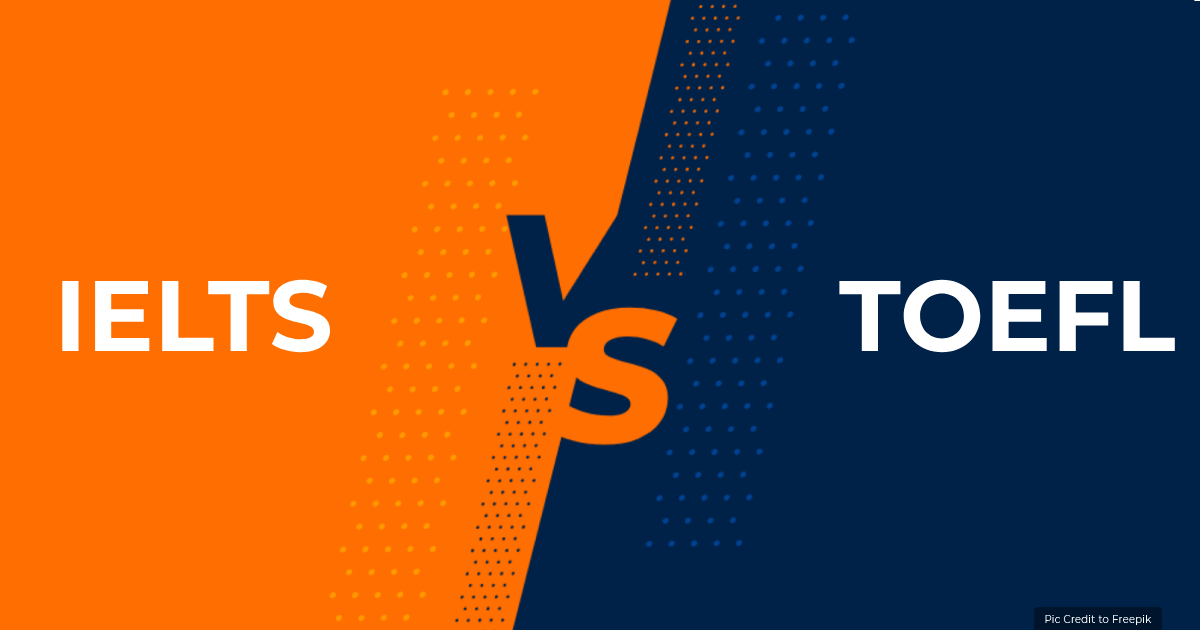IELTS vs TOEFL Comparison – In today’s global landscape, showcasing your English language proficiency is more important than ever. Whether your goals involve pursuing higher education, landing a lucrative job, or simply connecting more deeply with a global community, a recognized certification of your English skills can be an immense asset. Two such globally recognized English language proficiency tests are the International English Language Testing System (IELTS) and the Test of English as a Foreign Language (TOEFL). Each test is designed to assess your English language skills in a comprehensive and objective manner. However, choosing between the IELTS and TOEFL can be daunting, especially when you’re unaware of the nuances of each test. This blog aims to dispel your doubts, offering a comprehensive comparison of IELTS vs. TOEFL, along with insights into preparation strategies for these significant exams.

Overview of IELTS and TOEFL
The International English Language Testing System (IELTS) and the Test of English as a Foreign Language (TOEFL) are essential in English proficiency exams. IELTS, jointly managed by the British Council, IDP: IELTS Australia, and Cambridge Assessment English, is a widely accepted English language proficiency test recognized by universities, immigration authorities, and professional bodies worldwide.
The IELTS test assesses your ability to read, write, listen, and speak in English, closely reflecting the practical use of English in everyday life. It offers two versions: IELTS Academic, for those applying for higher education or professional registration, and IELTS General Training, for those migrating to Australia, Canada, and the UK or applying for secondary education or work experience in an English-speaking environment.
On the other hand, TOEFL, administered by the Educational Testing Service (ETS), is a prominent English proficiency exam predominantly recognized by North American universities. The TOEFL test measures your ability to use and understand English at the university level, focusing on how well you combine listening, reading, speaking, and writing skills. It primarily comes in an internet-based format (TOEFL iBT) but also offers a paper-based format (TOEFL PBT) in areas where internet testing isn’t possible. Both the IELTS and TOEFL serve the purpose of proving English proficiency for various reasons, including study, work, and migration. However, the choice between IELTS vs. TOEFL depends on your specific needs and circumstances, which we’ll delve into in the following sections.
Structure of IELTS and TOEFL
The IELTS and TOEFL exams each cover four main areas of English proficiency: listening, reading, writing, and speaking. However, they do so in distinct ways. The IELTS exam, lasting for about 2 hours and 45 minutes, divides these four skills into separate components. The Listening section includes 40 questions based on four recordings and lasts approximately 30 minutes. The Reading section, with 40 questions based on various reading materials, lasts about 60 minutes. The Writing section requires you to complete two tasks in about 60 minutes, and the Speaking section is a 11-14 minute conversation with an examiner.
IELTS
There’s a difference between IELTS Academic and IELTS General Training in the Reading and Writing sections. The Academic version contains texts and tasks suitable for individuals seeking higher education or professional registration, while the General Training version focuses on social and workplace contexts. On the other hand, TOEFL is a bit longer, approximately lasting about 3 to 4 hours. The Reading section includes 3-4 passages, each followed by 12-14 questions, to be completed in 60-80 minutes. The Listening section comprises 6 audio tracks, each followed by 5-6 questions, to be finished in 60-90 minutes. The Speaking section consists of 4 tasks to be completed in about 20 minutes. Finally, the Writing section consists of 2 tasks in 50 minutes.
TOEFL
TOEFL iBT is internet-based, assessing your English skills as used in an academic context, while the TOEFL PBT (paper-based test) is administered in areas without reliable internet access, focusing more on knowledge and understanding of the English language rather than practical usage. To understand this in detail, let’s look at the sections in the exams. Both the exams have four sections: Reading, Writing, Listening, and Speaking.
IELTS VS TOEFL Reading
- IELTS – In IELTS reading, a student is given three passages. All of them are different types of passages. The main aim of this section is to assess the student’s ability to understand the idea of the passage.
- TOEFL – The passages are mainly for the University Level Educational Text in the TOEFL reading test. You have to read 3-4 passages, and for each passage, you have to answer the 10 questions per page.
| Exam | IELTS | TOEFL |
| Number of Questions | 40 | 40 |
| Total Time | 60 minutes | 54-72 minutes |
IELTS VS TOEFL Listening
- IELTS – The IELTS listening test evaluates the student’s ability to understand a conversation and important information. In the IELTS exam, students will be provided with 4 recorded monologues. The first two monologues deal with social needs, and the other two are related to the area of education. You can only hear the audio once, and the questions are based on them.
- TOEFL – Students are evaluated by listening to recorded lectures and conversations for the TOEFL exam. They are required to answer questions based on 3 to 4 lectures and 2 to 3 conversations that they have heard. A lecture has 6 questions, and a conversation has 5 questions.
| Exam | IELTS | TOEFL |
| Total Number of Questions | 40 | 40 |
| Total Time | 30 minutes | 41-57 minutes |
IELTS VS TOEFL Writing
- IELTS – IELTS writing test is designed to test the student’s ability to have clear and organized ideas of their own. The rational thinking of the ideas and portraying them in an understandable manner. Students have to write two essays – one short and another long.
- TOEFL – TOEFL writing test is to evaluate student’s ability to write in a well-organized manner. Students are given two tasks – one integrated task – reading (3 mins), listening (2 mins), and writing (15 mins) and another essay writing task.
| Exam | IELTS | TOEFL |
| Number of Questions | 2 | 2 |
| Total Time | 60 minutes | 50 minutes |
IELTS VS TOEFL Speaking
- IELTS – The main objective of the IELTS writing test is designed to assess the student’s skill in spoken English. The student has to appear for a face to face interview with the interviewer.
- TOEFL – TOEFL speaking test is also designed to assess the student’s speaking ability. In this exam, TOEFL has up to 4 tasks, the first is to speak about a familiar topic, and the second task is an integrated speaking task in which the student speaks, reads, listens or both and further speaks on the topic.
| Exam | IELTS | TOEFL |
| Total Parts | 3 | 4 |
| Total Time | 10-15 minutes | 17 minutes |
Difference Between IELTS and TOEFL – A Comparative Analysis
The difference between IELTS and TOEFL aims to assess your English language proficiency; they present a fundamental list of comparisons that can influence your decision between the two.
SCOPE
Both tests aim to assess English language proficiency. However, IELTS has a broader scope as it is used for both academic purposes and job opportunities/ migrating to English-native countries, while TOEFL is primarily used for academic pursuits. IELTS assesses both British and American English, while TOEFL primarily focuses on American English
TYPES
TOEFL has two types of tests, namely- Academic and General Training. Academic is tailored for academic pursuits while the General training is focused on assessing proficiency level enough just socially to interact in an English-native country
TOEFL, on the other hand, has only one type of test that focuses solely on assessing English proficiency for academic purposes.
FORMAT
One of the primary differences between IELTS and TOEFL lies in their format. While IELTS provides options for both paper-based and computer-delivered testing, TOEFL is primarily internet-based, with a paper-based test only available in certain locations.
SCORING
The scoring systems also vary. In IELTS, you’ll receive a band score from 0 to 9 for each section and an overall score, with half-band scores (e.g., 6.5) possible. TOEFL, in contrast, gives you a score between 0 and 30 for each section, with the total score ranging from 0 to 120.
TIME DURATION
In terms of duration, the TOEFL exam might be a bit lengthier than IELTS, depending on the number of passages and tracks in the Reading and Listening sections.
FEES
The cost of the two exams also varies, with both tests generally ranging from $150 to $300, but this depends on the country where you’re taking the test.
LOCATION AVAILABILITY
IELTS is available in more than 140 countries, and testing facilities are available at 1600 locations worldwide. TOEFL is available in over 170 countries with 6000 testing facility locations and also offers. TOEFL Home iBT, allows students to take the test from their homes on 4 working days a week
Despite these differences between IELTS and TOEFL, they share several similarities. Both tests are designed to assess your reading, writing, listening, and speaking skills. They also enjoy widespread recognition globally, accepted by thousands of institutions in numerous countries. The frequency and availability of both tests are also quite similar, allowing candidates to choose a date and location that best suits their needs.
Choosing Between IELTS or TOEFL
When it comes to choosing between IELTS or TOEFL, several factors may come into play. The choice often depends on your individual needs and circumstances.
Your study or migration destination can significantly influence your decision. If you’re targeting institutions in the UK or Australia, you may lean towards IELTS, as it’s widely accepted in these countries. Conversely, if your goal is to study in the US, TOEFL might be your preferred choice, given its widespread acceptance by American universities. However, remember that both tests enjoy global recognition. So always check the specific requirements of your chosen institutions or immigration authorities.
Another factor to consider is your comfort with different English accents. IELTS uses a range of accents in its listening test, including British, American, and Australian. It mirrors the diversity of the English language in real life. TOEFL, meanwhile, primarily uses North American accents.
Finally, your preferred test format might be a determining factor. If you prefer paper-based tests, you might lean towards IELTS, which offers this option globally. Or if you’re comfortable with online tests, both IELTS and TOEFL provide this option.
IELTS Vs TOEFL – Result & Acceptance Ratio
Here across the globe, IELTS and TOEFL are both accepted as English Proficiency around the world.
IELTS scores are considered over 9000+ institutions in more than 140 countries, including the UK, USA, Canada, Australia, New Zealand, etc.
TOEFL scores are considered to be over 11000+ institutions in more than 150 countries, including the UK, USA, Canada, Australia, New Zealand, Germany, etc.
If you are planning to study in the US, then it considers TOEFL as the major requirement and other countries consider IELTS.
IELTS Vs TOEFL – Scores Conversion and Comparison
The IELTS and TOEFL scores vary a lot. The IELTS scores band scale of 0-9, and the TOEFL score range from 0-120. Below we have provided you the table which can help you to get the score conversion and comparison.
| IELTS Score | TOEFL Score |
| 0-4 | 0-31 |
| 4.5 | 32-34 |
| 5 | 35-45 |
| 5.5 | 46-59 |
| 6 | 60-78 |
| 6.5 | 79-93 |
| 7 | 94-101 |
| 7.5 | 102-109 |
| 8 | 110-114 |
| 8.5 | 115-117 |
| 9 | 118-120 |
Preparing for IELTS and TOEFL
Whether you choose IELTS or TOEFL, preparation is key to achieving a good score. Familiarize yourself with the structure of the test, the types of questions asked, and the grading criteria.
The British Council offers a wide range of preparation materials, including practice tests, apps, and courses, for IELTS exam preparation. Use these resources to get a good understanding of what the exam is like.
TOEFL exam preparation can be done using the resources provided by ETS, which include practice tests, sample questions, and test prep books. These materials can help you get a feel for the exam and improve your skills in each section.
Conclusion
Remember that consistent practice is essential to do well in these exams. Plan your study schedule, practice regularly, and review your performance to identify areas you need to work on.
Ultimately, choosing IELTS and TOEFL depends on what works best for you. Evaluate your options, prepare thoroughly, and you’ll be well on your way to achieving your English language certification goals.
IELTS and TOEFL are prestigious, globally recognized English language proficiency tests that serve as gateways to many opportunities. However, they have distinct formats, scoring systems, and focus areas. They both assess the same fundamental language skills: listening, reading, writing, and speaking. Your choice between IELTS vs. TOEFL should be based on your requirements, comfort level with the test format, and the preferences of the institutions or bodies you’re applying to.
Once you have received your IELTS or TOEFL score quite well, you can connect to our admission counsellors, who can guide you through the admissions process and provide you with the best career counselling with SMS Plus. Our admission counsellors will help you with the application and visa process and get exciting fee waivers and scholarships with the process.
FAQ’s about IELTS vs TOEFL Comparison
Q1. Which test is more widely accepted, IELTS Vs TOEFL?
Both IELTS and TOEFL are widely accepted globally. However, some regions or institutions may prefer one over the other. It’s advisable to check the specific requirements of the institution or body you’re applying to.
Q2. Which English accents are used in IELTS Vs TOEFL?
IELTS uses a range of English accents, including American, British, and Australian in its listening tests, while TOEFL primarily uses North American accents.
Q3. Is one test harder than the other?
The difficulty level of IELTS and TOEFL depends on your individual skills and comfort with the test format. Some might find the TOEFL’s North American accent easier to understand, while others may prefer the variety of accents in IELTS.
Q4. How long are the scores valid for both tests?
The scores for both IELTS and TOEFL are valid for two years from the date of the test.
Resources and Additional Reading
For IELTS Preparation:
Cambridge English’s Official IELTS preparation materials
IELTS Liz, a resource offering free IELTS tips, lessons, and advice
For TOEFL Preparation:
ETS’s official TOEFL preparation materials




